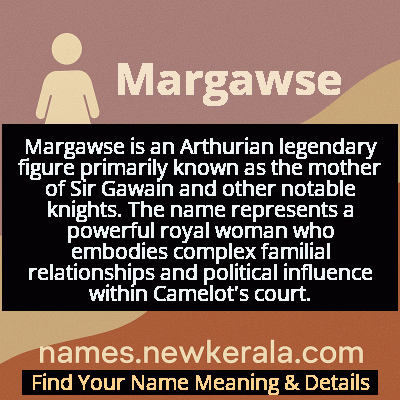Margawse Name Meaning & Details
Origin, Popularity, Numerology Analysis & Name Meaning of Margawse
Discover the origin, meaning, and cultural significance of the name MARGAWSE. Delve into its historical roots and explore the lasting impact it has had on communities and traditions.
Name
Margawse
Gender
Female
Origin
Arthurian
Lucky Number
6
Meaning of the Name - Margawse
Margawse is an Arthurian legendary figure primarily known as the mother of Sir Gawain and other notable knights. The name represents a powerful royal woman who embodies complex familial relationships and political influence within Camelot's court.
Margawse - Complete Numerology Analysis
Your Numerology Number
Based on Pythagorean Numerology System
Ruling Planet
Venus
Positive Nature
Harmonious, responsible, caring, and artistic.
Negative Traits
Overly idealistic, superficial, possessive, or jealous.
Lucky Colours
Pink, turquoise.
Lucky Days
Friday.
Lucky Stones
Diamond, turquoise.
Harmony Numbers
2, 3, 9.
Best Suited Professions
Artists, musicians, teachers, healthcare workers.
What People Like About You
Warmth, nurturing nature, artistic flair.
Famous People Named Margawse
Margawse of Orkney
Arthurian Queen and Sorceress
Mother of Gawain and key figure in Arthurian political dynamics
Queen Morgause
Literary Character
Central figure in major 20th century Arthurian retellings
Morgause le Fay
Mythological Figure
Represented complex female power in Celtic Arthurian tradition
Name Variations & International Equivalents
Click on blue names to explore their detailed meanings. Gray names with will be available soon.
Cultural & Historical Significance
Her portrayal evolves significantly across different Arthurian traditions, reflecting changing medieval attitudes toward female power and sexuality. In earlier Welsh texts, she appears as a more straightforward royal figure, but in later French and English romances, she becomes increasingly complex—sometimes depicted as engaging in an incestuous relationship with Arthur that produces Mordred, thus contributing directly to Camelot's downfall. This transformation makes her a fascinating case study in how female characters were adapted to serve different narrative and moral purposes throughout the development of Arthurian literature. Her story illustrates the limited but significant ways in which women could exercise power in medieval courtly society.
Extended Personality Analysis
Margawse is characterized by a formidable combination of political intelligence and fierce maternal devotion. As a queen and mother of knights, she demonstrates remarkable strategic acumen, often navigating the treacherous waters of Arthur's court to advance her sons' positions and protect their interests. Her personality blends royal authority with deep emotional investment in her family, creating a woman who is both dignified and passionately engaged in the fortunes of her children. This maternal focus sometimes leads her to make morally ambiguous choices, revealing a pragmatic and occasionally ruthless aspect of her character when her family's welfare is at stake.
Beyond her political and maternal roles, Margawse often possesses connections to magical knowledge or older traditions, suggesting a personality that spans both the worldly and mystical realms. She displays considerable emotional complexity—capable of genuine affection alongside calculated manipulation, particularly in her relationships with Arthur and her various sons. This psychological depth makes her one of the most nuanced female characters in Arthurian literature, representing the difficult balancing act faced by powerful women in a patriarchal society. Her character explores themes of loyalty, ambition, and the compromises required to maintain influence, making her a rich subject for literary analysis and modern reinterpretation.
Modern Usage & Popularity
In contemporary times, the name Margawse remains exceptionally rare and is primarily confined to academic discussions of Arthurian literature, historical fiction, and specialized interest communities. It has never gained mainstream popularity as a given name, likely due to its complex mythological associations, challenging pronunciation, and the morally ambiguous nature of the character in many Arthurian traditions. The more common variation 'Morgause' sees slightly wider recognition but remains firmly within niche usage. Recent decades have witnessed growing interest in Arthurian names, particularly among fantasy enthusiasts and historical fiction readers, though Margawse has been largely overshadowed by more accessible Arthurian names like Guinevere, Morgan, or Isolde. Its usage today is almost exclusively literary or scholarly rather than practical naming convention.
Symbolic & Spiritual Meanings
Margawse symbolizes the intricate relationship between maternal power and political ambition within medieval courtly society. She represents the often-unseen influence that royal women wielded in shaping dynastic politics and knightly reputations, serving as a metaphor for how female agency operated within the constraints of patriarchal systems. Her character embodies the tension between personal loyalty and public duty, particularly in her dual roles as Arthur's half-sister and mother to his most prominent knights. The name also carries connotations of ancient wisdom and connection to pre-Christian traditions, positioning her as a symbolic bridge between older magical practices and the new Christian order represented by Camelot. Her narrative arc illustrates the complex moral landscape that powerful women navigated, making her a symbol of both limitation and subversion within the Arthurian mythological framework.

